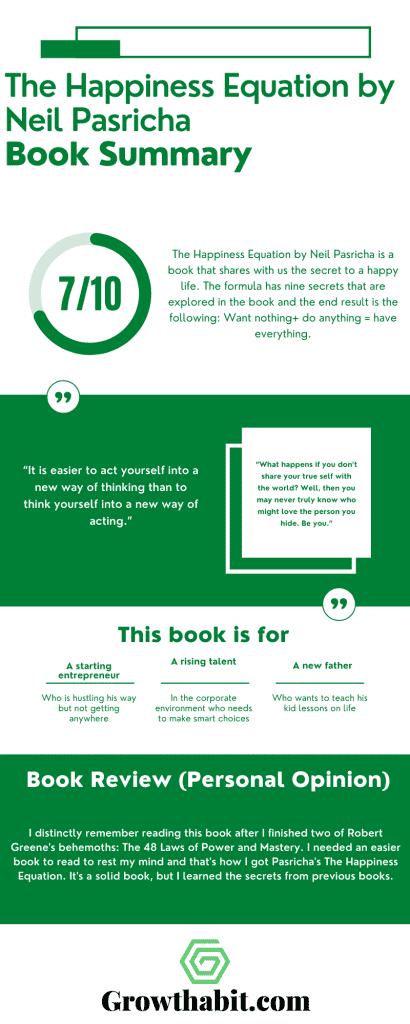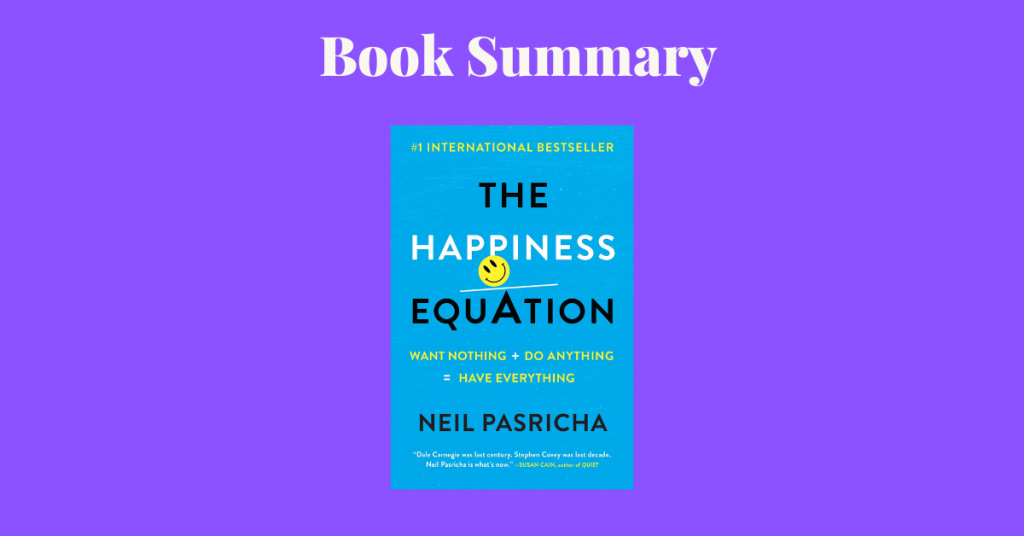The Happiness Equation by Neil Pasricha is a book that shares with us the secret to a happy life. The formula has nine secrets that are explored in the book and the end result is the following: Want nothing+ do anything = have everything.
Book Title: The Happiness Equation: Want Nothing + Do Anything = Have Everything
Author: Neil Pasricha
Date of Reading: August 2018
Rating: 7/10
What Is Being Said In Detail:
The Happiness Equation has a three-part structure and each part has three chapters that are titled “secrets.”
A single sentence can summarize each secret and when we implement all of them, we will fulfill the happiness formula.
Want Nothing
The first part shares the secret on the importance of not wanting things in our lives.
- Secret #1 The First Thing You Must Do Before You Can Be Happy. The first secret is about making yourself happy first.
- Secret #2 Do This and Criticism Can’t Touch You. The second secret is to remember why you do it (you do it for yourself).
- Secret #3 The Three Words That Will Save You on Your Very Worst Days. The third secret is about remembering the lottery— you’re born and still alive on this planet (there were more than 100 billion people on Earth and more than 93% of them are dead at this moment while you’re still alive).
Do Anything
The second part is about doing conscious action so you can achieve happiness.
- Secret #4 The Dream We All Have That Is Completely Wrong. The fourth secret is to never retire because that’s when our brains perish into oblivion.
- Secret #5 How to Make More Money Than a Harvard MBA. The fifth secret is to overvalue you and make sure that you calculate how many hours you spend working on getting your salary. $150K a year means nothing if you work 80 hours a week.
- Secret #6 The Secret to Never Being Too Busy Again. The sixth secret is to create space in your life because that’s when you come up with breakthroughs.
Have Everything
The third part is about combining everything learned before to create a happy life.
- Secret #7 How to Turn Your Biggest Fear into Your Biggest Success. The seventh secret is to just do it— it’s easier to act yourself into a new way of thinking than to think yourself into a new way of acting.
- Secret #8 The Simple Way to Master Your Most Important Relationship. The eighth secret is to be you (become an authentic individual).
- Secret #9 The Single Best Piece of Advice You’ll Ever Take. The ninth secret is not to take advice— people give advice that they would take in your position, but they’re not you nor are they in your position with your mindset and skills.
Most Important Keywords, Sentences, Quotes:
Introduction
“William James said, “Plasticity, in the wide sense of the word, means the possession of a structure weak enough to yield to an influence but strong enough not to yield all at once.”
”How much money do I need to retire?” “What’s the best way to handle criticism?” “How do I get more done with less stress?” “How do I find my true passion?” “How can I cure my anxiety?” “What’s the best way to achieve more inside and outside work?”“What do I do when everyone gives me different advice?” “How can I become a more positive person?”
Want Nothing
Secret #1 The First Thing You Must Do Before You Can Be Happy
“Now everything changes. Everything changes. If we start with being happy, then we feel great. We look great. We exercise. We connect. What happens? We end up doing great work because we feel great doing it.”
“The problem isn’t that we have negative thoughts in our brain. The problem is we think we shouldn’t have negative thoughts.”
“Rather than find good results and make them better, our brains do this: 1. Look for problem. 2. Find problem. 3. Improve problem.”
“If I knew everything about your life circumstances—your job, your health, your marital status, your income—I could predict only 10% of your happiness. That’s it! The remaining amount is not determined by your external world but by the way your brain processes.”
Secret #2 Do This and Criticism Can’t Touch You
“I kept writing every day, adding links to email signatures and blog comments I left around the Web. I got stickers printed and started handing them out. I wrote #951 Hearing a stranger fart in public, #933 The first scoop out of a jar of peanut butter, and #909 Bakery air. Flash-forward a few months later and . . . I got to one million hits!”
“Nine months after I had started my blog, I suddenly reached ten million hits, won two awards for Best Blog in the World, and was approached by literary agents to turn my blog into a book.”
“I woke up early and started interview after interview. I posted a special entry called #526 When dreams come true. My voice turned scratchy, bags under my eyes turned black, and I was sleeping three or four hours a night. And then, finally, the next Saturday morning the newspaper came out and . . . I hit #2 on the bestseller list! It was a dream come true. I went to bed happy. I had achieved my goal. My publishers were excited, too! Their joy said to keep pushing.”
“It’s hard to compete endlessly because there’s always more to compete with when you get there. Remember we will always be number two to seven billion at everything in the world.”
“A CEO once told me, “You always think the geniuses are at the next level.” But the next level never ends unless you are literally the best in the entire world. What are the odds of that happening? Well, they are one in seven billion.”
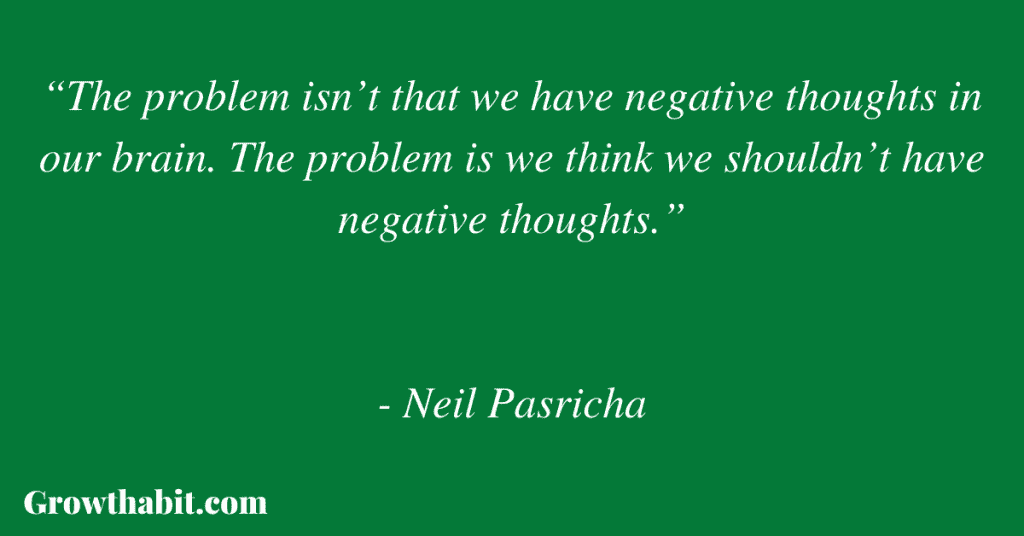
“Studies show that when we begin to value the rewards we get for doing a task, we lose our inherent interest in doing the task. Like, we literally lose interest—as in, the interest we have becomes truly lost in our minds, hidden away from our own brains, as the shiny external reward sits front and center and becomes the new object of our desire.”
“So why did my Harvard professor consider himself a failure? “I walk up to my office door every morning and see that the professor in the office to my left has a Nobel Prize . . . and I know I’ll never have a Nobel Prize,” he continued. “And I see that the professor in the office to my right has written twelve books . . . and I know I’ll never write twelve books. I haven’t even written one. Every single morning I’m reminded how inferior I am and it kills me.”
“Physicist Richard Feynman said, “You have no responsibility to live up to what other people think you ought to accomplish. I have no responsibility to be like they expect me to be. It’s their mistake, not my failing.”
“Remember Secret #2. What do you do so criticism can’t touch you? Remember to do it for you.”
“NCAA Final Four was more exciting to watch than the NBA. “I don’t understand,” I said. “These college guys are running as fast as possible, diving for balls, jumping for difficult shots, smiling and laughing the whole time. When I flip to an NBA game the point guard is walking up the court. Everyone is sitting on the bench instead of standing and screaming.” He smiled and said, “The college guys aren’t getting paid for it. They might never get paid for it. They’re doing it for themselves. Because they love it.”
Secret #3 The Three Words That Will Save You on Your Very Worst Days
“None of us can control our emotions. We can only control our reactions to our emotions.”
“It is a war waged inside your own head. Our problem-scanning machine (amygdala) and our serenity-now mood tape (prefrontal cortex) are at war.”
“Kurt Vonnegut wrote in The New Yorker after Joseph Heller passed away: True story, Word of Honor: Joseph Heller, an important and funny writer now dead, and I were at a party given by a billionaire on Shelter Island. I said, “Joe, how does it make you feel to know that our host only yesterday may have made more money than your novel ‘Catch-22’ has earned in its entire history?” And Joe said, “I’ve got something he can never have.” And I said, “What on earth could that be, Joe?” And Joe said, “The knowledge that I’ve got enough.” Not bad! Rest in peace!”
“1. Remember 2. The 3. Lottery”
“There are about 7 billion people on Earth today and 115 billion people who have ever lived in the history of the world. That means 108 billion people are dead.”
“Being alive means you’ve already won the lottery. You are among the wealthiest people in the entire world. The average world income is five thousand dollars. Are you higher than that? Then you’re in the top 50%. And if you’re higher than fifty thousand dollars you’re in the top 0.5%. Do you need much more than 99.5% of people alive? You either have the money to buy this book or you have the time to read it. Either way, you have it good! You already have more than almost everybody on the planet. On your very worst days, you have to push your negative thoughts. You have to take a step back. You have to remember the lottery. Because you’ve already won.”
Do Anything
Secret #4 The Dream We All Have That Is Completely Wrong
“Teddy Roosevelt said, “The best prize that life has to offer is the chance to work hard at work worth doing.”
“There are many breeds of dog that just need to be working, and useful, or have a job of some kind, in order to be happy. Otherwise they are neurotically barking, scratching, or tearing up the sofa. A working dog needs to work. And I am a working dog.”
“If you like thinking, if you like trying, if you like creating, if you like teaching, if you like learning, if you like connecting, then chances are good you’re a working dog, too. And what do working dogs do? They work. They never give up. They never stop doing. They never retire.”
“This is where a ninety-six-year-old defeated a former boxing champ in his thirties. This is where a 105-year-old killed a poisonous snake with a flyswatter. There are more people over a hundred years old there than anywhere. Researchers from National Geographic were so fascinated by Okinawans that they studied what helped them live so long. What did they find out? They eat off smaller plates, they stop eating when they’re 80% full, and they have a beautiful setup where they’re put into social groups as babies to slowly grow old together.”
”Never retire. Your brain needs exercise or it will atrophy.”
“Why work? Let’s break it down.”
“Social”
“Today study after study shows that it is our social connections that are the single biggest driver of our happiness.”
“Structure”
“They all have 168 hours in their weeks. No more, no less. The richest man in the world can’t buy more time. It’s just not for sale. So the question isn’t how can we create more time but how can we use our time more effectively?”
“This scribble is similar for most working people. A bucket of sleep. A bucket of work. But here’s the big breakthrough: You have an entire fifty-six-hour bucket left! And if you sleep or work less than fifty-six hours, congrats! Your third bucket is even bigger than mine. This is your third bucket.”
“But my point is you need to spend your third bucket on your passion. You deserve to spend that third bucket on your passion. Know what you’re spending your third bucket on. And make sure it’s something you love.”
“Stimulation”
“When I speak to companies I ask everybody in the audience to spend thirty seconds writing down one awesome thing that happens to them at work. We leave cue cards on their chairs beforehand. Then I ask people to trade their cue card with somebody who they’ve never talked to before. And then we read the cue cards in front of the room. That’s when we realize that in a span of seconds we came up with thousands of awesome things together.”
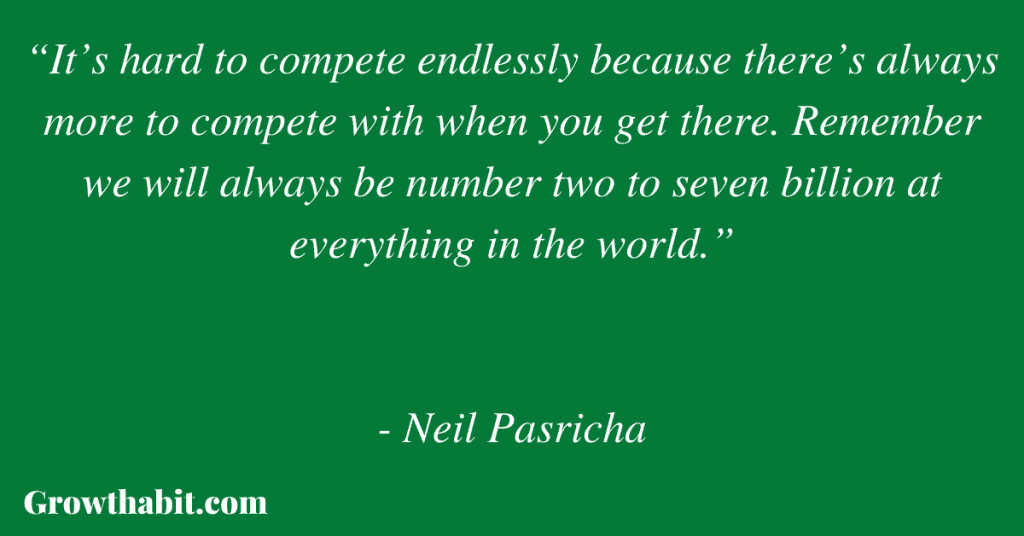
“Story”
“Coke wants to give the world happiness breaks. Harvard Business School is educating leaders who make a difference in the world. Facebook is making the world more connected. Wikipedia is giving the sum of human knowledge to every single person for free. The Red Cross prevents and alleviates human pain and suffering. Google is organizing the world’s information.”
“It chops you out of a productive story. You aren’t part of something bigger than yourself anymore. This hampers your ikigai! So don’t give up work. You’ll be giving up the Social, Structure, Stimulation, and Story you get every day from being there. Forget the money. You’ll lose the 4 S’s, and they are much more important.”
“Fortune magazine published a report saying the two most dangerous years of our lives are the year we’re born . . . and the year we retire.”
“I know when you look you’ll always find meaty projects and passionate causes you can sink your teeth into. Just keep learning, keep changing, and keeping growing. And promise me that you will never retire.”
Secret #5 How to Make More Money Than a Harvard MBA
“The average graduating salary is $120,000! To put that in perspective, the average American makes $24,000.”
Point is: Every single job is paid by the hour. Some are forty hours a week, some are eighty, some are one hundred and twenty. But no matter how much money you’re making, the numerator is how much you get and the denominator is how much you work. Every single job is paid by the hour.
So how do you make more money than a Harvard MBA? Two ways:
1. Work more hours and make way more per year.
2. Work way less hours and make less per year.
Secret #6 The Secret to Never Being Too Busy Again
”When we take time off from working on a problem, we change what we’re doing and our context, and that activates different areas of our brain,” says Keith Sawyer, author of Explaining Creativity. “If the answer wasn’t in the part of the brain we were using, it might be in another. If we’re lucky, in the next context we may hear or see something that relates—distantly—to the problem we had temporarily put aside.
”Can I ask you a question?” I asked him one night while working late. “Where do you get your clothes?” He laughed. “You won’t believe it. Once a year I buy thirty white boxers, thirty identical pairs of black socks, fifteen custom-fitted dress shirts, and five pairs of black pants. I do laundry once a month. I never match socks, I never shop on weekends, I never spend any time thinking about what I’m wearing. It’s Always the next thing in my closet. You’ll probably see this blue shirt again in a couple weeks.
“He simply made better decisions, by making fewer decisions, by reserving his decision-making energy for things that mattered.”
“But having more choice reduces our happiness. We get decision fatigue. What happens? We avoid the decision or we make a bad decision. And we always worry we made the wrong choice.”

“You look at decisions you make on a daily basis and decide which ones to automate, regulate, effectuate, and debate.”
“Free your brain. Just don’t mistake these smaller decisions for the more important decisions in which they reside. Deciding to work out every day is important. Picking which dumbbell to lift next is not.”
“Everybody was working as fast as they could, but it felt slow to customers. What happened? Work expands to fill the space available and the result is lower quality.”
”Parkinson’s Law,”
“It is a commonplace observation that work expands so as to fill the time available for its completion.”
“What’s the counterintuitive secret to having more time? Chop the amount of time you have to do it.”
“Nothing kills productivity faster than a late deadline.”
“As my friend Mike once told me, “Screwing up two things at the same time isn’t multitasking.”
“1. How to make every decision at twice the speed? Remove choice. 2. What’s the counterintuitive way to having more time? Remove time. 3. How to add an hour to the day with only one small change? Remove access.”
Have Everything
Secret #7 How to Turn Your Biggest Fear into Your Biggest Success
“For me, when it came to swimming, I couldn’t get past Can Do (“I can’t swim”) or Want to Do (“I don’t want to swim”), so I never got to Do (“I’m going swimming”).”
“What’s the difference? Look at the Do Circle. It’s endless. There is no start or finish. It keeps going and going and going. You don’t have to end at Do. Do can be a starting point! Do leads to Can Do!”
“What happened in the pool? I did it . . . so I believed I could do it . . . so I wanted to do it. Instead of finishing at Do, I started there. And that made me think I can do. And that made me want to do. Everything happens backward. You start doing, and confidence and motivation follow.”
“So what big lesson did I learn that day? I learned it’s not easier said than done. It’s easier done than said.”
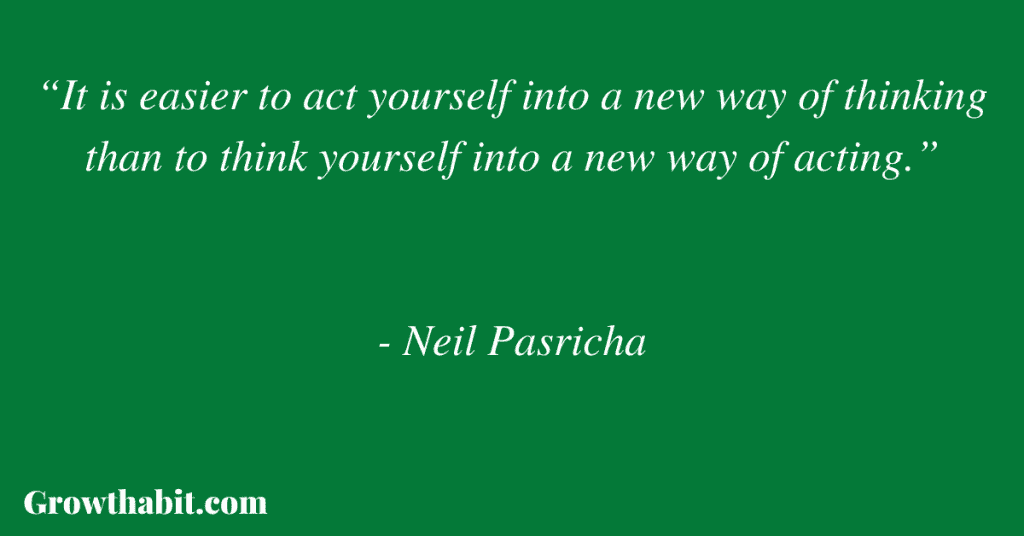
“He explained it best in his First Law of Physics. “An object in motion will remain in motion unless acted on by a larger force.” Put it another way: Start doing something? You’ll continue. Why? Because motivation doesn’t cause action. Action Causes motivation.”
“Very low. The greatest leaders just try and try and try. They try. And then they try. And then they try some more. Sure, you will fail at some things. But you’ll keep moving. And more often you’ll succeed. Little wins turn into confidence and desire to try again, which leads to bigger wins.”
“It is easier to act yourself into a new way of thinking than to think yourself into a new way of acting.”
Secret #8 The Simple Way to Master Your Most Important Relationship
“There is nothing more satisfying than being loved for who you are and nothing more painful than being loved for who you’re not but pretending to be.”
“Ralph Waldo Emerson said, “To be yourself in a world that is constantly trying to make you something else is the greatest accomplishment.” But it’s not easy. So why should you aim for it?”
“Ask yourself that one crucial question, think about it for a second, and answer it out loud. What do you do on Saturday morning when you have nothing to do? Do you go to the gym? Do you record yourself playing guitar? Take whatever answer you have and then wildly brainstorm ways you can pursue opportunities that naturally spew from that passion. There will be hundreds.”
“The Bench Test worked for Fred because he immersed himself in the new situation he wanted to test and then That’s what The Bench Test is about. Really putting patiently observed his authentic reaction to that situation. yourself into something new for a short time to test it.”

”The company is the five people you sit beside.” My leadership professor at Harvard said this all the time. What did he mean? The five people on your team, the five people you eat lunch with every day, the five people telling you all about the company—they are the company. They create and help articulate your view of the company.”
“What happens if you don’t share your true self with the world? Well, then you may never truly know who might love the person you hide. Be you.”
“If I’m happy 80% of the time and Leslie’s happy 80% of the time, how often are we in good moods together? 64%. How did we get 64%? Because 80% times 80% is 64%. That’s when our good moods overlap. A full two-thirds of the time! We’re both smiling and loving and happy and life is funny and moments are precious and everything is in its right place. These are the great days. The great moments. The best side of life. How often are we in bad moods together? The answer is 4% of the time. Because 20% times 20% is 4%.”
Secret #9 The Single Best Piece of Advice You’ll Ever Take
“Remember: Advice reflects the adviser’s thoughts, not your thoughts.”
“Any cliché, quote, or piece of advice that resonates with you only confirms to your mind something you already know. Charles Varlet wrote back in 1872, “When we ask advice we are usually looking for an accomplice.”
“Always remember there are only three goals. To want nothing. That’s contentment. To do anything. That’s freedom. To have everything. That’s happiness. What are the nine secrets to get us there?”
Book Review (Personal Opinion):
I distinctly remember reading this book after I finished two of Robert Greene’s behemoths: The 48 Laws of Power and Mastery. I needed an easier book to read to rest my mind and that’s how I got Pasricha’s The Happiness Equation. It’s a solid book, but I learned the secrets from previous books.
Rating: 7/10
This Book Is For (Recommend):
- A starting entrepreneur who is hustling his way but not getting anywhere
- A rising talent in the corporate environment who needs to make smart choices
- A new father who wants to teach his kid lessons on life
If You Want To Learn More
Here’s Neil Pasricha having a Google Talk.
Google Talks
How I’ve Implemented The Ideas From The Book
I’ve implemented all nine secrets from the book, but I really doubled down on the last secret: don’t take advice. Most people in my environment told me that I’m making mistakes all my life by not getting a steady job and just putting my head down. I took risks and I bet on myself and that ended up being the best decision of my life.
One Small Actionable Step You Can Do
Wherever you are in life, you can benefit from at least one of the nine secrets. So pick a relevant one from the list and implement it in your life:
- Be happy first
- Do it for you
- Remember the lottery
- Never retire
- Overvalue you
- Create space
- Just do it
- Be you
- Don’t take advice
